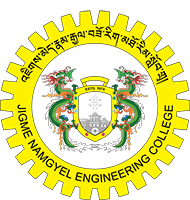Basic information on the programme
Title of the award : Bachelor of Engineering in Mechanical Engineering
Duration and mode of study : Four years, full time study
The award granting body : The Royal University of Bhutan
Initial date of approval : 28th -29th November 2018, 43rd AB (Validated)
Aims of the programme
The Bachelor of Engineering in Mechanical Engineering (BE in Mechanical Engineering) programme is designed to produce mechanical engineering graduates for the knowledge-based economy by providing fundamental knowledge and skills required for the practice of mechanical engineering in a broad range of industries. The provision of such education will contribute to enhancing national capacity and capability to develop and lead technological advancement in the field of mechanical engineering.
Graduates of the programme will be equipped with the capacity to systematically apply engineering principles to work situations and develop innovative solutions for mechanical engineering problems.
Further, the programme intends to develop the ability of graduates to analyze, synthesize and design engineering systems through analytical techniques, experimental and laboratory skills and the use of modern engineering simulation and design software tools through the provision of a balance of theory and hands-on experiences.
Learning Outcomes of the Programme
Upon successful completion of the programme, graduates will be able to:
- Analyze mechanical structures and provide correct design.
- Analyze, design, model and draft mechanical components using CAD software.
- Setup, carry out part programming and perform CNC machining
- Design and setup production/manufacturing systems and processes for manufacturing mechanical elements or systems.
- Apply engineering design to provide solutions that meet specified needs within realistic constraints such as economic, environmental, social, ethical, health and safety, manufacturability and sustainability.
- Carry out economic analysis of mechanical engineering related projects
- Design and conduct experiments as well as analyze and interpret data
- Supervise the manufacturing processes
- Oversee troubleshooting and maintenance of mechanical and/or electro-mechanical systems or machines.
- Measure various parameters such as pressure, temperature, vibration and interpret the result.
- Carry out basic research in the relevant area.
- Communicate effectively through different mediums for both technical and non-technical audiences.Programme Structure
Curricumum Highlights:
| Yr. | Semester | Module | ||||
| I | I |
EGP101 Engineering Graphics |
DZG101 Dzongkha Communication |
ACS101 Academic Skills |
FME104 Material Science |
FEE102 Fundamentals of Electrical Engineering |
| II |
FME105 Mechanics of Materials-I |
AMA102 Applied Mathematics-I |
MDD103 Mechanical Drawing |
ADE101 Analog and Digital Electronics |
COP204 Data Structure & Object Oriented Programming in C++ |
|
| II | I |
FME206 Mechanics of Materials-II |
AMA103 Applied Mathematics-II |
FEE203 Fundamentals of Electrical Machines |
FME207 Metrology |
PAE206 Engineering Thermodynamics |
| II | FME208 Fluid Mechanics |
AMA205 Applied Mathematics-IV |
MPT205 Manufacturing Processes-I |
FME209 Kinematics & Dynamics of Machines |
MDD204 Computer Aided Design/ Computer Aided Manufacturing |
|
| III | I |
PAE307 Hydraulic Machines |
AMA306 Numerical Methods & Optimization |
MPT306 Manufacturing Processes-II |
MDD305 Design of Machine Elements |
PAE308 Heat & Mass Transfer |
| II |
CSY303 Automatic Control System |
PAE309 Heating, Ventilating & Air Conditioning |
MPT307 Advanced Manufacturing Technology |
MDD306 Mechanical Vibrations |
PRW303 Research Methodology |
|
| IV | I |
IAM405 Mechatronics |
IAM406 Fluid Power & Automation |
PAE410 Automotive Engineering |
ECM403 Engineering Economy |
PRW405 Project |
| II |
IAM407 Industrial Engineering |
IAM408 Maintenance Engineering |
Elective |
OJT402 Internship & Seminar |
||
